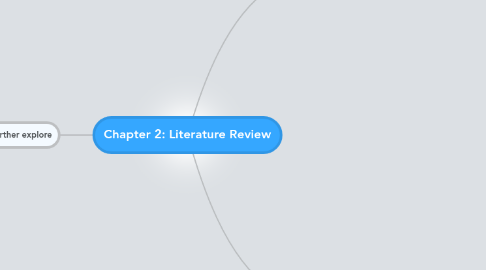
1. 9 Areas to further explore
1.1. 2.3.3 Perceptions of Desirability of Entrepreneurship
1.1.1. McStay's Thesis
1.2. Embeddness in the Environment/Ecosystem
1.3. Learning Preferences
1.4. 6.2 Student Entrepreneurship as a survival tool
1.4.1. Only Small business ventures on campus to cope with their financial situations (Africa)(Ndirangu & Bosire 2004)
1.4.2. it exists but not what I am looking at
1.5. 3 Debate Teachibiity of Entrepreneurship
1.6. 4 Popular Content on Archetypical andStudent Entrepreneur
2. Section 1
2.1. Define Student Entrepreneurs
2.1.1. 1 Definitions
2.1.1.1. Entrepreneurship
2.1.1.2. Student Entrepreneurship
2.1.1.3. Archetypical Entrepeneur
2.1.1.4. Successful Entrepreneur
2.1.2. Youth Entrepreneurship
2.1.2.1. with and without degrees
2.1.2.2. all types
2.1.2.2.1. Mom and Pop's
2.1.3. How have Studentpreneurs been studieds: Intentions vs. practice
2.1.3.1. 6.1.1 Roger Henderson, Martyn Robertson, (2000) "Who wants to be an entrepreneur? Young adult attitudes to entrepreneurship as a career
2.1.3.2. 6.1.2 Veciana, J.M., Aponte, M. & Urbano, D. 2005, 'University students’ attitudes towards entrepreneurship: A two countries comparison'
2.1.3.3. it exists but not what I am looking at
2.1.4. Student Entrepreneurship is an Emerging Phenomenon
2.1.4.1. 6.3.1 The State-sponsored student entrepreneur(Mars, Slaughter & Rhoades 2008)
3. Section 2
3.1. Why is it so important: Introduce 2 research questions to develop a strong research agenda
3.1.1. 1) Often theories developed on entrepreneurs have not taken into consideration the diversity of entrepreneurs but more like a meta category. This is the opportunity to zoom in on one category of entrepreneur SE and test for some theories. SE are entrepreneurs in their own rights
3.1.1.1. Types and Traits
3.1.1.1.1. Typology
3.1.1.1.2. Psychological Traits
3.1.1.2. PSYCHOLOGICAL TESTING
3.1.1.3. Dynamic Capabilities
3.1.2. 2) SE is also an exemplary case , with incredible examples (Michael Dell, Bill Gates, Mark Zucherberg,...) and with extraordinary conditions (educational environment, low cost of starting a business). They have not really been studied before even though they have a huge impact on the global economy
3.1.2.1. Multiple Identity
3.1.2.1.1. Cognitive Processes
3.1.2.1.2. Identity Construction
3.1.2.1.3. Multiple Identities
3.1.2.2. HOW DOES EDUCATION ADD VALUE TO STUDENTPRENEURS? SUPPORTING VS. TEACHING
